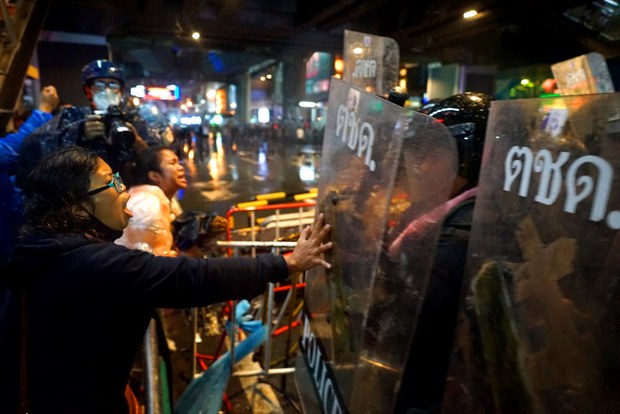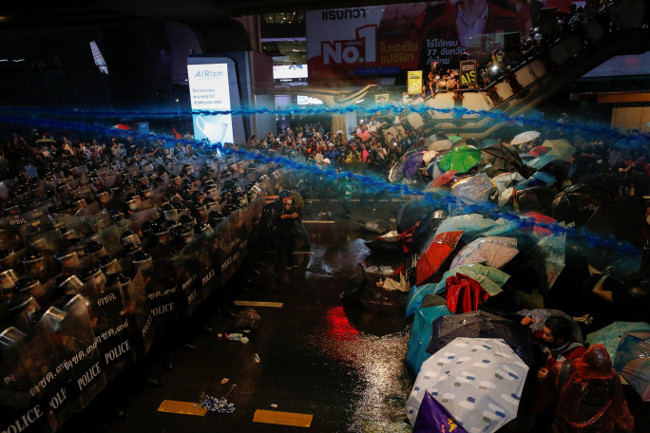Thai Police Fire Water Cannons at Pro-Democracy Protesters
2020.10.16
Bangkok
 Protesters try to stop Thai police from advancing on their gathering at the Siam Square business district in Bangkok, Oct. 16, 2020.
Protesters try to stop Thai police from advancing on their gathering at the Siam Square business district in Bangkok, Oct. 16, 2020.
Updated at 5:30 p.m. ET on 2020-10-16
Thai riot police turned water cannons mixed with a chemical dye that can irritate skin at pro-democracy demonstrators Friday night, after thousands gathered in Bangkok for a second straight day to defy a new state of emergency.
Prime Minister Prayuth Chan-o-cha earlier in the day said he was refusing to heed protesters’ calls for his resignation as he justified his move to declare an emergency and renew a ban on large political gatherings.
Leading up to Friday’s rally, which moved from the Erawan Shrine to the nearby Siam Square, police had warned protesters and closed metro stations and roads to prevent them from reaching the scene.
“It is an unlawful protest, violating the emergency decree. The police followed international standards of procedure,” police spokesman Col. Krisana Pattanacharoen said Friday.
The firing of water cannons in the Thai capital’s downtown area took place in the evening after protesters refused to disperse and obey the ban on gatherings that went into force early Thursday morning.
Officers armed with shields and batons fired the water cannons containing the dye Methylene blue, which sticks to skin, to allow them to identify the activists, police said. At least seven activists were arrested and were being held at a barracks for border police, according to authorities.
It was the first time Thai authorities used water since a series of mass anti-government and youth-led protests began in mid-July. These demonstrations have called for the government of Prayuth, a former junta leader and retired army chief who led a military coup in 2014, to be removed from power and for reforms to laws that protect the monarchy, among other demands.
Thousands of protesters, including high schoolers, had gathered under an elevated monorail. They called out to supporters above them to toss down umbrellas in an effort to protect themselves from the water cannons.
Panupong Jadnok, one of the student leaders of the protests, told the demonstrators to move to the nearby Chulalongkorn University while volunteers tried to block the riot police from advancing.
“We condemn the crackdown on high school and university students and citizens at Pathumwan intersection. … The government chose to use force and fuel the flame of hatred practiced by dictatorship. Prayuth Chan-o-cha must be responsible for all damages caused,” opposition parties involved in the protest said in a joint statement.
Lek, 60, a Bangkok cook who asked that his last name not be used to protect his identity, said he showed up because does not agree with the government, adding authorities used too much force to disperse the protesters.
“I joined the protest today because I saw that this is not right. This government did not come to power the right way,” he said. “The students gathered to call on (the government) to step down. They haven't done anything bad, they just criticized.”
Police said four officers and 11 activists were injured, adding that none of the injuries were serious.
Earlier on Friday, Prayuth led a cabinet meeting to formally endorse a month-long state of emergency for Bangkok and a ban on public political gatherings of five or more people, which took effect at 4 a.m. Thursday.
The declaration empowers the military to assist police to keep the peace, to arrest suspects without a court’s consent, to allow suspects to be held longer than the criminal code allows and to detain suspects outside of police station or court cell. Police have been holding arrestees in military camps or prisons.
“The enforcement is for the benefit of the majority of people. The government is keeping order in politics, parliament and under the constitution,” Prayuth told reporters after the meeting. “I don’t mean to do anyone harm.”
He dismissed protesters’ calls that he resign and allow a new election.
“I won’t quit. What have I done wrong, what is my guilt?” Prayuth said.

On Thursday, police arrested 22 activists after thousands defied police orders, forcing businesses near the Erawan Shrine to close. The Ratchaprasong intersection, where the Hindu shrine is located, is a prime business section and was the scene of deadly violence in similar protests in 2010 and 2014.
Officers arrested two activists on Friday who were accused of harassing Queen Suthida and her stepson when their motorcade was briefly trapped among protesters near the Government House on Wednesday, officials said. Thousands of pro-democracy and pro-royalist counter-demonstrators had gathered around Democracy Monument and the Government House.
Ekachai Hongkangwan and Bunkueanun Paothong, were seen chanting to urge protesters to raise three fingers while pro-royalists who gathered in the same area chanted “long live the queen,” according to a video clip broadcast on Nation TV.
Police filed warrants on a charge of harmful intention to the queen on Thursday and arrested Ekachai a day later as he was walking to Dusit police station to surrender while Boonkeu turned himself in at the same station. If convicted, they could be sentenced to life, police said.
‘Hong Kong model’
Reporters asked the prime minister if the protesters’ latest approach resembled efforts by pro-democracy activists in Hong Kong.
“All businesses were ruined by the Hong Kong model. Thailand is democratic, not democratic-socialist like Hong Kong. I want all Thais to behave their best,” Prayuth said.
Chinese Foreign Minister Wang Yi, who met with Prayuth on Thursday, said Beijing was backing the Thai prime minister.
“China firmly supports Thailand in taking a development path that suits its own national conditions and supports Thailand in maintaining social stability and achieving development and prosperity,” he said, according to Xinhua, China’s state news agency.
Michelle Bachelet, the United Nations High Commissioner for Human Rights, and other international activists spoke out against the government action.
“We are particularly concerned about the application of serious charges, including the crime of sedition, against individuals for peacefully exercising their fundamental rights,” Bachelet spokeswoman Ravina Shamdasani said on Friday, according to Reuters news service.
Another U.N. official, Clement Voule, the special rapporteur on freedom of association and peaceful assembly, tweeted his concern as well.
“I’m very worried about the information on crackdown on protesters in #Thailand. The ‘severe state of emergency’ declared and the arrests in Bangkok are stifling freedom of assembly. The government needs to allow protesters to exercise their rights and seek dialogue, not suppress them,” he wrote.
Ming Yu Hah, Amnesty International’s deputy regional director for campaigns, expressed alarm over what she called excessive force.
“The use of water cannons and irritants not only poses serious risk of injury, the use of dye is indiscriminate and could lead to the arbitrary targeting and arrest of peaceful protesters, journalists, or simply local residents who were marked with the coloring,” Ming Yu said.
“We urge the Thai authorities to comply with their international obligations and facilitate the right to peaceful assembly. They must let peaceful protesters express their views – not exacerbate tensions further.”
Brad Adams, the Asia director for Human Rights Watch, said Prayuth’s emergency declaration gives authorities “unchecked powers to suppress fundamental freedoms.
“The Thai government has created its own human rights crisis,” Adams said in a news release issued on Thursday. “Criminalizing peaceful protests and calls for political reform is a hallmark of authoritarian rule.”
The pro-democracy protesters have been holding rallies since July 18 and have called for Prayuth to resign, for the constitution to be rewritten for the royal institution to be reformed.








